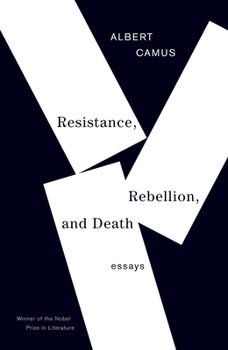Resistance, Rebellion, and Death: Essays
Select Format
Select Condition 
Book Overview
NOBEL PRIZE WINNER - Twenty-three political essays that focus on the victims of history, from the fallen maquis of the French Resistance to the casualties of the Cold War.
In the speech he gave upon accepting the Nobel Prize for Literature in 1957, Albert Camus said that a writer cannot serve today those who make history; he must serve those who are subject to it. Resistance, Rebellion and Death displays Camus' rigorous...
Format:Paperback
Language:English
ISBN:0679764011
ISBN13:9780679764014
Release Date:August 1995
Publisher:Vintage
Length:288 Pages
Weight:0.55 lbs.
Dimensions:0.7" x 5.1" x 7.9"
Customer Reviews
4 ratings
The agony of a humanist
Published by Thriftbooks.com User , 19 years ago
This collection of essays is the most brilliant one of Camus' diverse smaller non-fiction writings. The bulk of this book concerns his journalistic writings on the Algerian Revolution, Soviet Union etc. Through these essays, you understand the pain of Camus. Camus' ethics doesn't agree to mindless violence for the sake of power. He makes an impassioned plea for tolerance and humanitarian solutions to the problems of war and peace. Camus is not necessarily logical or politically correct. His stand on the issue of independence of Algeria is a compromised position between French imperialism and Algerian aspirations for freedom during that period. However, in his passion for diagnozing the problems of his time and addressing them, he hits upon a lot of interesting insights and arguments. Particularly brilliant for both its analysis and its conclusion is Camus' landmark long essay 'Reflections on the Guillotine' which occupies a fair part of the book. In this essay, Camus systematically demolishes all legal or quasi-moral justifications for capital punishment and answers the third aspect of the question - Whether human life is worth taking? In his 'The Myth of Sisyphus', he had argued against self-murder. In 'The Rebel', he argued against murder and genocide. In this essay, he argues against legalized murder. But unlike his earlier works where he offered weak arguments after a brilliant analysis, here he hits the mark by demolishing the justifications for capital punishment, totally. This particular essay deserves to be considered a classic in the philosophy of law and justice.
Bracing clarity
Published by Thriftbooks.com User , 20 years ago
I cannot recommend this book highly enough. It has provided me with the strongest, most clear-headed confidence in the face of unrelenting hypocrisy and struggle. Camus was on the side of the angels for all of the conflicts of his time, a time that saw the darkest face of humanity. His arguments for compassion and justice are utterly transfixing and revelatory, and written with a clarity and insight that are simply breath-taking. I challenge anyone that supports the death penalty to read "Reflections on the Guillotine" and walk away with their arguments intact. In this piece Camus utterly demolishes every argument for state-sanctioned murder while defending the right to live with dignity, a right that can easily encompass the self-defense by combat necessitated by circumstance. Camus was a moral, intellectual, and physical hero, and reading these essays one is almost overcome by his sense of humilty, justice, and compassion. His writing is so crystalline, it's almost jolting. This is a powerful tonic for all those that despair of creating a place for the best qualities of the human race in times of utter darkness. A must-read.
An essential to the library called your mind
Published by Thriftbooks.com User , 21 years ago
For nearly 30 years I have carried this book with me virtually everywhere. No, it's not "an easy read" - but it is worth buying (owning)and treasuring - if only for the FOURTH LETTER (to a German Friend)- it is the most moving argument/declaration for humanity and choosing it that I have ever seen anywhere.Some (like Sartre?) might call it a "rationalization". But even those who have resigned themselves to the religions of cynicism and despair - could find a remnant of fight and even "goodness" (yikes!) inside themselves. Camus' words remind us that resignation and the inevitable indifference and inhumanity that follow are the ultimate betrayals of life. While there is nothing "cheerful" or even optimistic about these writings - you'd have to be cold-blooded, heartless and completely beyond repair or redemption not to be inspired by the wistful aspirations that Camus exudes from his admittedly battered heart and soul.I disagree with the reviewer (who did praise this precious book) Sartre is smart - but so is Camus - and Camus exudes the humanity that Sartre can't even see or imagine.Sartre would tell us that we always have the freedom to at least rattle our chains (at least theoretically) - but Camus has the power to inspire us to want to.
A good book.....
Published by Thriftbooks.com User , 24 years ago
Camus' essays are obviously more difficult to read than hisstories, and quite possibly more difficult to read than his philosophical investigations as well. Should they be read? Of course. In them, he speaks of similar topics (i.e. what to do in the face of absurditiy, human moral dilemmas, etc.) as he does in the other books, though in a more precise, more direct fashion. His views on the death penalty shaped my own almost completely. What you get in this book are coherent arguments by a coherent, nuainced thinker. Is Sartre smarter than Camus? Camus knew enough to fear most -isms and -ologies where Sartre did not... (not that I recommend ignoring Sartre either! )






